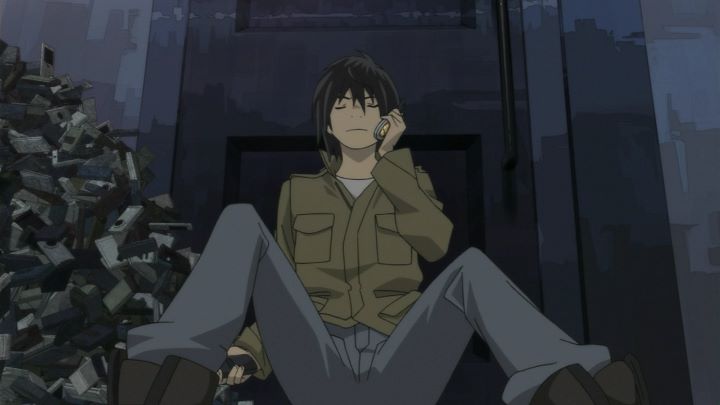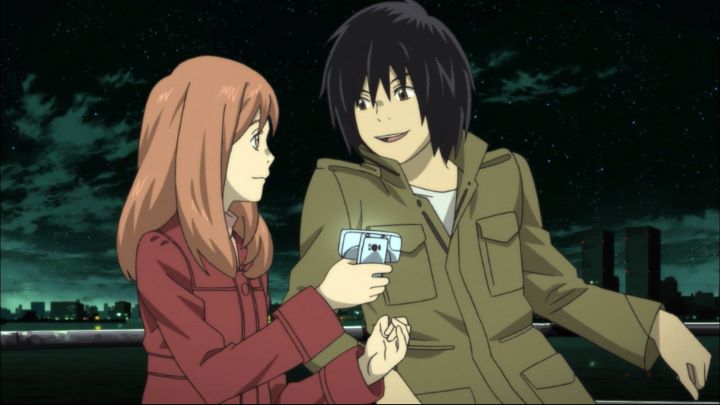








"Eden of the East" is one of the first television anime I purchased on a whim on DVD, having only viewed the free first episode through Funimation's Youtube channel. Despite it's odd pacing and unvieling of its premise, there was something striking about it that I didn't want to spoil myself the rest. In many ways, this carries on throughout the entirety of the 11-episode series, and despite any flaws it has, its strengths are so significant that it remains one of my favorite anime shows to this very day. After finding out that the director is the very same behind the excellent "Ghost in the Shell - Stand Alone Complex" series, I put Kenji Kamiyama on my "directors-to-watch" list, a shame given he really doesn't direct often enough.The premise on paper is quite brilliant, and would inspire imitators in the years to follow: if you had the means to change anything, to fix the world, what would you do? That is what twelve random Japanese inviduals are asked when they separately given a cell phone connected to a mysterious digital assistant with access to the equivalent of millions of American dollars. They can ask the voice of "Juiz" for almost anything, if money and technology is capable of making it happen. They are tasked by the organizer to use these tools to "save Japan." Save from what? A terrorist threat? A declining economy? No one knows, but only one "winner" will be chosen after the country is saved, and the rest will be "eliminated." The game isn't public and the players don't know the identities of each other, less what they would each do with the money. And so the mystery thriller begins, under the themes of creating a better future out of present day troubles.The show doesn't unveil this premise from the get-go like other shows might. It starts in Washington D.C., from the perspective of Saki, a Japanese college student questioning the system at the center of the economic world. Her thoughts are interruptted when Akira Takizawa presents himself, buff-naked with nothing but a gun and a cell-phone in his hand (this probably happens more often than you would think at the White House). After a short chase by the authorities, Akira explains that he has no memories up to the point that he was naked outside the White House, and after properly getting dressed, accompanies Saki back to Japan. It turns out his cell phone belongs to the game, and as the show plays out, we are left wondering if Akira himself had requested to loose his memory as part of a grander plan. We are also made aware at the end of the first episode of "Careless Monday," a day in Japan when a series of missles had somehow struck the country, and yet no casualaties had occurred.It's a lot to take in, but while it seems like poor direction or messy-script organization, I describe it as an excellent piece of world-building. We are constantly left guessing what will happen next and what the players will come up with in their role of the game. Some players couldn't care less about saving Japan, some resort to more extreme measures to move the country forward. This only really makes up about half of the story, the other half following Saki as part of the "Eden club," a tech startup developing a community-driven photo-recognization app. Aside from a budding romance between the careless Akira and whistful Saki, her viewpoint reminds us of the state of modern culture: the youth of Japan are struggling to find a place in the job market with the constantly changing world of technology and consumerism, and with the growing age of workers refusing to retire or share wealth with the 99%. Their place in the grand scheme of the plot feels a little forced, but still necessary to help us understand what, if anything, Japan must be saved from, and ultimately what guides Akira and the other game players. It gives a heart and honesty to the mind games, and is made worthwhile thanks to a knockout of a cliffhanger ending. It is still one of my favorite endings in anime, no contest. The production is solid, subdued but confident. There isn't all that much to animate as the show largely revolves around talking heads, but characters still move and express with a grounded realism and backgrounds have fantastic detail that make it all feel right. The character designs are a bit unuusal, inspried by Chica Umino's (known for her manga "Honey and Clover") character designs with rounded faces, wide smiles and blushing cheeks. It takes some time to get used to, but overall the show is arguably the most solid that Production I.G. had made in those years. The music is surprisingly satisfying in how modern it feels, not overbearring in rock or pop. The ending credits, especially the paper-cutout animation and vocal song, also stand out as a favorite of mine that other series should take notice of. The English dub is fine, but the Japanese dub is the better of the two, and the plot doesn't give much opportunity to either for expressing much emoition: like the rest of the production, much of it is grounded.Looking back at the show, it's hard to deny that there are a variety of minor problems with it, but the basic premise, strong beginning and fantastic ending make it a worthwhile adventure. "Eden of the East" feels significantly more mature and forward-thinking in its themes and hints of new technology than almost any other show to date, a testament to Kamiyama's vision. Nothing else is quite like it, and it is, in my mind, irreplacable.
The production is solid, subdued but confident. There isn't all that much to animate as the show largely revolves around talking heads, but characters still move and express with a grounded realism and backgrounds have fantastic detail that make it all feel right. The character designs are a bit unuusal, inspried by Chica Umino's (known for her manga "Honey and Clover") character designs with rounded faces, wide smiles and blushing cheeks. It takes some time to get used to, but overall the show is arguably the most solid that Production I.G. had made in those years. The music is surprisingly satisfying in how modern it feels, not overbearring in rock or pop. The ending credits, especially the paper-cutout animation and vocal song, also stand out as a favorite of mine that other series should take notice of. The English dub is fine, but the Japanese dub is the better of the two, and the plot doesn't give much opportunity to either for expressing much emoition: like the rest of the production, much of it is grounded.Looking back at the show, it's hard to deny that there are a variety of minor problems with it, but the basic premise, strong beginning and fantastic ending make it a worthwhile adventure. "Eden of the East" feels significantly more mature and forward-thinking in its themes and hints of new technology than almost any other show to date, a testament to Kamiyama's vision. Nothing else is quite like it, and it is, in my mind, irreplacable.